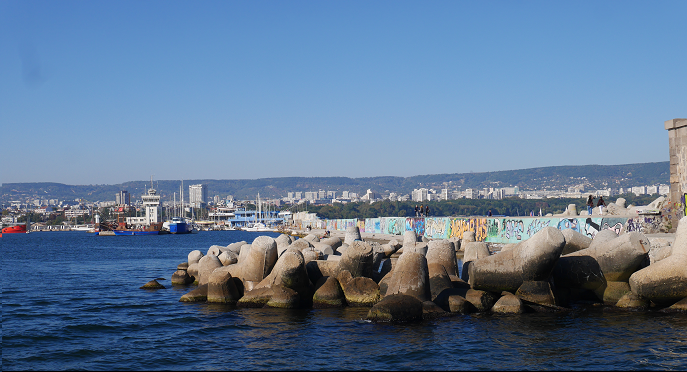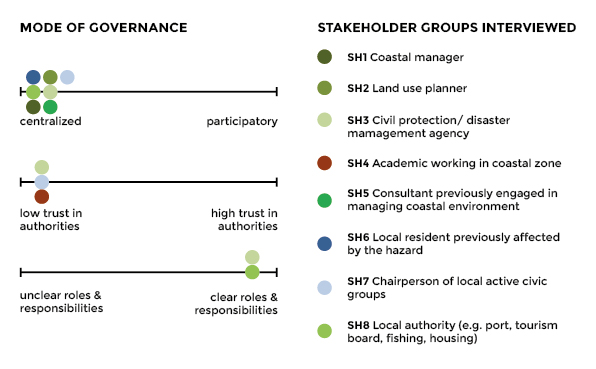This section provides an example of local coastal governance in the case study area of Varna, Bulgaria.

Governance of coastal zones and disaster risk
Coastal protection and management
Coastal protection and risk assessment are activities coordinated at the national level. The Regional Administration of Varna coordinates regional and local development plans in the 12 municipalities of the Varna region. The main priorities of the Varna Regional Development Plan include: modernising existing and creating new infrastructure; developing the coastal and maritime economy; and supporting sustainable sea and nature tourism. Interviewed coastal managers in Varna reflected these aims, noting that the greatest need is to build erosion control facilities and modern infrastructure. These managers felt that maintenance of existing shore protection structures was poor, with few innovative strategies and methods proposed. Beach nourishment was last conducted in the 1980s, meaning that some beaches are almost completely eroded.
Flood risk management
The Black Sea Basin Directorate in Varna is one of the four Basin Directorates responsible for implementing the EU Floods Directive in Bulgaria. The Black Sea Basin Directorate has already prepared its report on preliminary assessment of flood risk and, in contrast to the national level, has produced flood hazard and risk maps for areas with potentially significant flood risks. Despite the perception that participation is low, in December 2015, a public consultation began on its Flood Risk Management Plan for 2016-2021. However, to date, there is no regional flood early warning system based on storm impact thresholds.
Civil protection and disaster risk reduction
Responsibility for disaster risk reduction and management lies with the Ministry of Interior, the Fire Safety and Civil Protection Directorate General (FSCP DG) and its 28 regional structures - including Varna oblast (NUTS 3 level).
The Unified Response System obliges all potentially dangerous sites, e.g. dams or industrial sites, to have local warning systems and alert systems for key actors at a regional level. In the case of a disaster, municipalities (LAU 1 level) receive signals and warnings from the Civil Defence, Varna Governor’s Office and from the Maritime Administration. To date, there is no local early warning system based on storm impact thresholds or for landslide-prone terrains.
Engagement of non-state actors in coastal governance
The Union of Bulgarian Black Sea Local Authorities (UBBSLA) is an independent non-governmental, voluntary, self-governing and non-profit organization that unites 21 municipalities bordering the Bulgarian Black Sea Coast. The UBBSLA encourages strong and effective local self-government and active citizen participation and technical assistance, capacity building and expertise e.g. preparation of expert opinions on the laws concerning the development of the Bulgarian Black Sea coast to provide a better legislative environment for local authorities and assist with implementation.
The Black Sea NGO Network (BSNN) coordinates NGOs in the Black Sea region to advocate for sustainable development. The Network raises civic awareness of coastal issues and aims to increase public participation. In Varna, the BSNN lobbies local/regional and national authorities to address coastal challenges. The Black Sea - Danube Association of Research and Development conducts research and consultancy in hydraulic engineering, coastal & harbour structures, and environmental protection. The Association also provides extensive training to experts from the public and private sectors.
In terms of seaside tourism, the main concessions for beaches in the area are:
Lazuren bryag - 91 Ltd. (for Varna city beaches) and Varna Seaside resorts (for other beaches in the area). These companies are responsible for the maintenance of the beaches. Since all coastal protection structures are state property they have no legal rights concerning renovation, maintenance and construction of the present and/or future protection structures. Nevertheless, if any damages to their property or beaches occur, they are the responsible parties to provide financial support and resolve the issues
Lazuren bryag - 91 Ltd. maintain close interactions with municipality and regional administration concerning coastal issues such as beach cleaning, elimination of damage to beach business properties due to storms. In 2016 they took active part in renovation of the Sea Baths, which are the main Varna city beach attraction and historical heritage. Along with the BSNN and the Black Sea - Danube Association of Research and Development, Lazuren bryag - 91 Ltd. also engages with the government through different investigative committees to discuss e.g. coastal management, flood risk plans, and address damages or pollution resulting from flooding and storm surges.
Private sector companies focused on coastal and environmental engineering in the Varna region include Cores (Coastal research engineering & environmental services) Ltd. and Ecoexpert Ltd, the latter being actively engaged in Risc-Kit research activities.
The Bulgarian Ports Infrastructure Company (BPI Co.) is provided State grants to manage the port infrastructure of the public transport ports of national importance in accordance with the Maritime Spaces, Internal Waterways and Ports of the Republic of Bulgaria Act. The BPI Co. is responsible for the construction, reconstruction, rehabilitation and maintenance of public transport ports of national importance; the maintenance of the existing and the building of new approach canals, sea and river depots for the disposal of dredging mass, breakwaters and protection facilities.
Stakeholder perceptions of governance
The graphic below provides a snapshot of how governance in Varna is perceived by those living and working in the area. The responses are the result of 30 in-depth interviews conducted with coastal stakeholders from eight different groups, presented in the list on the right. Interviewees who commented on the mode of governance are plotted on the graph on the left.

Stakeholder perceptions of governance in Varna reflect the overall low level of trust in state authorities at the national level. Interviewees agreed that there was a clear distribution of responsibilities. However, despite the fact that DRR governance and flood risk management structures are decentralized, governance was perceived as highly centralized. Stakeholders highlighted the limited collective action and resources in Varna, with a focus on near term, urgent problems, rather than longer term risk reduction activities.
Interviews with stakeholders in Varna suggested that communication was lacking in many areas; both between the national and municipal level as well as between coastal stakeholders more generally.
There is limited communication between different stakeholders
Many stakeholders believe the government in Sofia has little sensitivity to local needs and thus does not prioritise action to secure funding for infrastructure and industries in coastal zones.
The coast is not seen as a priority for the central government
However, the rationale for the low resource allocation may be more complex. The devastating flash flood that took place in the Asparuhovo residential area of Varna in June 2014, for example, has been attributed to illegal deforestation and construction in the hills above the residential area; improper urban planning; lack of coordination between central and local authorities; and pollution and poorly maintained infrastructure. In this way, funds may be being reallocated to avoid corruption – real or perceived – or simply to avoid a perceived lack of effectiveness.
Reduced state funding due to local organised crime
A more general issue raised by interviewees related to communication and information sharing. Access to information on coastal hazards and coastal land-use was considered particularly difficult and was raised as a critical issue hindering citizen awareness and coastal development.
There are few channels for citizens to obtain information
The following table provides a list of local policies for coastal protection and disaster risk reduction in Varna, Bulgaria.
TABLE 1: OVERVIEW OF KEY POLICIES FOR COASTAL PROTECTION AND DISASTER RISK REDUCTION IN VARNA
|
Type |
Policy |
Description |
|---|---|---|
|
Civil protection |
Regional Development Plan |
|
|
Coastal management |
Varna Master Plan |
|
